#northern québec
Photo
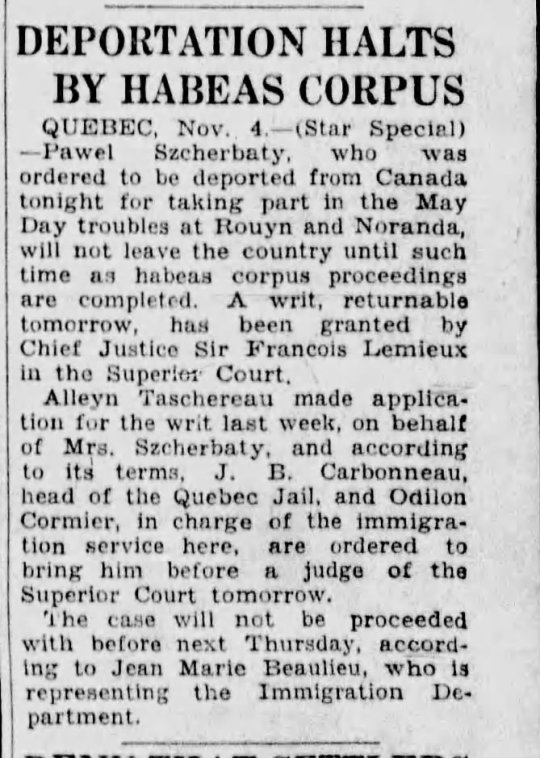
“DEPORTATION HALTS BY HABEAS CORPUS,” Montreal Star. November 4, 1932. Page 25.
----
QUEBEC, Nov. 4— (Star Special) — Pawel Szcherbaty, who was ordered to be deported from Canada tonight for taking part in the May Day troubles at Rouyn and Nornada, will not leave the country until such time as habeas corpus proceedings are completed. A writ, returnable tomorrow, has been granted by Chief Justice Sir Francois Lemieux In the Superior Court.
Alleyn Taschereau made applicatlon for the writ last week on behalf of Mrs. Szcherbaty, and according to its terms, J. B. Carbonnenu, head of the Quebec Jail, and Odilon Cormier, in charge of the immigration service here, are ordered to bring him before a judge of the Superior Court tomorrow.
The case will not be proceeded with before next Thursday, according to Jean Marie Beaulieu, who is representing the Immigration Department.
#ville de québec#habeas corpus#may day#rouyn#noranda#rouyn-noranda#political protest#political demonstration#dangerous foreigners#undesirable citizens#deportation from canada#immigration department#polish immigration to canada#quebec jail#quebec city#great depression in canada#northern québec#crime and punishment in canada#history of crime and punishment in canada#shoveling out the unwanted
2 notes
·
View notes
Text
Québec: Calls Scotland, Ireland, Northern Ireland and Wales "Uncle Alba, Auntie Éire, Uncle Éireann and Uncle Cymru" respectively
Also Québec: Just calls England "England"
#she prefers her aunt and uncle#that and Scotland and France were still dating when she was Nouvelle-France#my headcanon of female Ireland stand#casual hate of Arthur Kirkland lmao#I had the idea for this post when in Scotland btw#hetalia#aph québec#aph quebec#marie tremblay#aph nouvelle france#aph england#aph scotland#aph ireland#aph northern ireland#aph wales
22 notes
·
View notes
Text

The idea that Hyperborea is hiding somewhere is the sole and only thing that keeps me going. An alternative to the modern world, a nordic paradise where i can feel that i belong to is what Hyperborea represent to me.
12 notes
·
View notes
Text
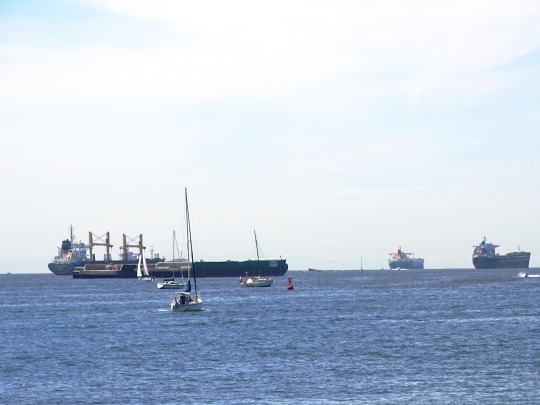


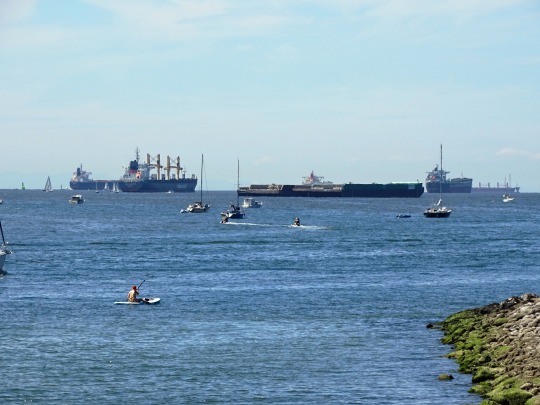









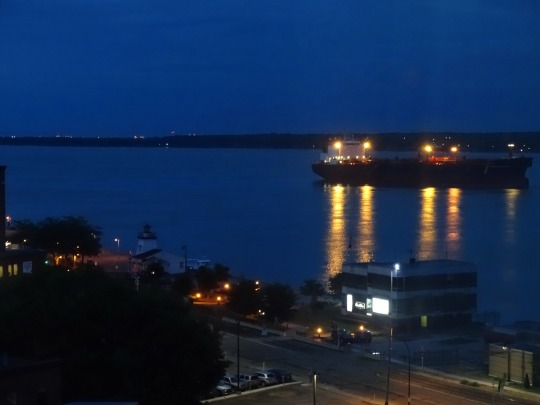




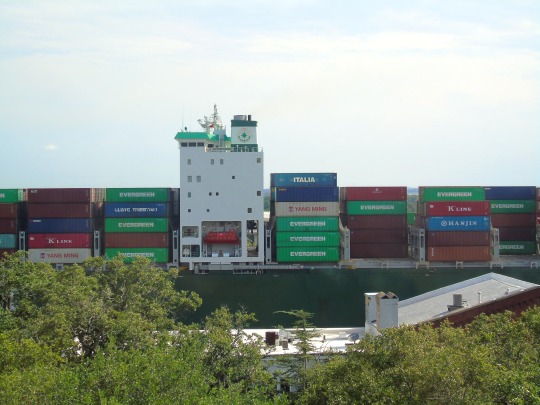

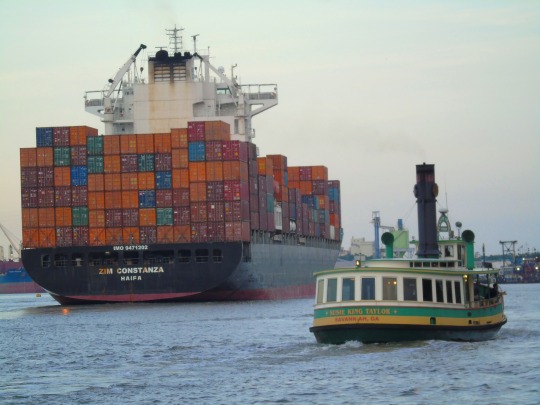







The SS Ideal X, the world's first successful container ship, left Port Newark, New Jersey for Houston, Texas on April 26, 1956.
#Pacific Ocean#Vancouver#Oakland#California#Halte de Sainte-Geneviève-de-Berthier#Trois-Rivières#Prescott#Canada#USA#St. Lawrence River#first container ship#26 April 1956#US history#original photography#anniversary#Savannah River#Savannah#Georgia#Ontario#Québec#Baltic Sea#Northern Europe#technology#cityscape#seascape#waves#travel#vacation#tourist attraction#architecture
2 notes
·
View notes
Text

Only -46°C, nothing to worry about.
#québec#winter#canada#it's currently -42°C here#i love feeling the northern winds but i think I'll pass & stay in front of the fire this time
1 note
·
View note
Text

#HuntedUntilExtermination
Northern Raven...
I am extremely pissed off today of our "changing and depending on which region of Canada we are living in", because laws are flexible and can change at any time.
Example: Nearly all native birds in Canada are protected, even if they don't migrate. But this law concerns only the category of small birds. Which is terribly weird for me because these small birds are here in abundance, like thousands and more of them. But for most native species as birds of prey, they are excluded from being protected, like; Hawks, Owls, Eagles, Falcons, Kingfishers, Ravens, Crows, Jays, as for three other species in the blackbird family, like; Rusty Blackbirds, Common Grackles, and Brown‐Headed Cowbirds. Unbelievable if we think about the White Headed Eagles who can have only one clutch of 1-3 eggs per year, (and the first born, the strongest one, can kill the other two to have more food for him, which mother Eagle will also let him do) and can be hunted? As for the rarely seen, Royal Eagle, who is always moving further to North for fear of human. Weird right!
Regarding to the BC Wildlife Act, "Ravens are Schedule C Wildlife, meaning they can be hunted any time, but you do need a hunting licence, unless !!! "you are hunting them on your property or they are damaging your property." Ravens are protected under the, Wildlife Act, except !!! in those regions of the province that have a hunting season for them. Ravens can trigger a wide range of human reactions. It may be disgust for some people to see them feeding on roadkills.Or to see them from your bedroom window can be annoyingly diligent at letting you know that it is 4 o'clock a.m. For Native people, Ravens are still honoured in many First Nations’ cultures while for ranchers can be horrified at them to find the eyes of newborn beef calves pecked out." -bcmag
Ravens, foxes, wolves,… they only try to survive like any other wild animals. It is called, the food chain… hello??? Maybe we should exterminate Roosters too?
So to say, Ravens are protected by the Fish and Wildlife Conservation Act in Canada but, don't have anymore any form of legal protection today.
It is like cannabis; it is against the law to grow marijuana in Québec but if you "live" in Canada, it is legal and you can!
What kind of Canadian bullshit law is this. Ravens have been hunted, trapped, poisoned, etc… for so many years until practically extermination. Ravens even teach their siblings to stay away from human as far as possible for all these reasons, but for some people, it is not enough.
So yes, I am right now fucking pissed off at our country. Ravens can now be hunted "again" because of some people that are disgusted by them.
@BenAdrienProulx
May 15th, 2024
#Hunted Until Extermination#Northern Raven#Ravens#Corvus corax#Crow#Corvus brachyrthynchos#Silent Hill#Roadkill#Wildlife Need Protection#IUCN#International Union for Conservation of Nature#ECCC#Environment and Climate Change Canada#FeederWatch#Count Feeder Birds for Science#NCC#Nature Conservancy of Canada#Raw Nature#Nature Photography#Nature Canada#Wild Bird Photography#Wildlife Photography#Animal Photography#Mountainous Parts of the Northern Hemisphere#Canada#The RavenKeeper
258 notes
·
View notes
Note
Oohhh a French speaking AFTG fan!
Can I ask what’s the general opinion on the Marseille accent? What do Canadians think of it? Is it fancy? Or rough?
ouhh what a question anon! i'm tagging @givemethedamnflowers so she can help me out too if u want to <3
also i don't speak for all Franco Canadians / Québécois. fiy. ya know.
as a Québécoise first and foremost (Canadian comes 2nd in how i view my identity), and as someone WHO HAS A MOREAU FROM MARSEILLES in my close family, i love the accent. to me it's somehow much less grating than the Parisian accent (not the international French accent, that one's ok) despite being much more pronounced and how do you say... quirky? not weird, but like it's definitely peculiar. special! i like it a lot. it also makes me love Jean Moreau even more because it adds character, an edge, another area of fondness. i personally think it's very easy to spot, but contrary to the north of France, it's easier to understand.
i would say the most northern accents are much rougher, more difficult to understand than Marseilles or Paris, also because of the disparity in colloquialisms and regional expressions. but i do love them so. Bourgogne?? Normandie?? oh how lovely. and then down down down down south, neighbor to Marseilles, l'Occitanie (a fave)!!! oh and la Corse!!! so so beautiful to me. music to my ears. maybe bc, as Québécoise, like i said, i feel a little kinship with those regions' accents, bc the Paris/Île-de-France spit upon our accents as shitty, ridiculous, "not real French" or generally make fun of us, like we're somehow less smart bc of the way we pronounce things and speak with our accent. in my experience! and trust me, i've had a lottttttt of 'em. so the little scene where Jean keeps being annoyed by Thea calling him 'Paris' when he's from Marseilles? ACCURATE & GOLDEN! made me smile.
that being said, as it has been discussed many many times in the fandom, characters like Neil, Kevin and Jean, and even Andrew and Nicky, have such wild backgrounds, with how much they move around geographically + their mixed heritage, that all of them must have unique accents you can't really pin down. Jean left Marseilles at 14, was homeschooled, then forced to learn Japanese then English, in West Virginia, from native Japanese speakers. he doesn't have the Marseilles slang, the refs; his French is stuck at that level and it can't progress, and he also probably loses a lot of it, breaking down over time. finding his words must be a a nightmare. imagine trying to translate a word that isn't even considered French nor translatable outside of Marseilles' region!!! also, how old were his parents? what generation of slang has he picked up by default? or was he, sadly, taught international French?
SO MANY QUESTIONS! UGH! aftg & languages, French specifically, give me a headache (and heartache) every time.
i would say, watch films and series! please! from every part of the Francophonie around the world! Belgium, Louisiana Cajun, Acadia, Québec, Marseilles, Niger... it's a beautiful language, despite his devastating shameful hand in colonization and racism. the way the people forced to learn and speak it to survive have all found ways to make it theirs in infinite ways that help the language evolve and become richer. French is as much theirs now, if not more. French is much more that than the Republic. French is not Paris.
thank you again anon for allowing me to go off on a tangent, and apologies if there are any mistakes, misinformation or harmful things. please let me know kindly and i'll own to it and correct anything that needs correcting!
#pls don't set a bounty on my head#i'm so sorry for this long ass response#my asks#aftg asks#aftg & french#jean moreau#kevin day#aftg#all for the game#the foxhole court#the sunshine court#neil josten#andrew minyard#nicky hemmick
45 notes
·
View notes
Text
today is canada day, so here are some canadian things that i think the bau members would enjoy
hotch would love tim hortons. he wishes they had it in the states. he'd love going on a timmies run through the drive thru on the way to work. he'd love the ubiquity of tim hortons. not quite on every street corner, but pretty darn close. he would enjoy cheap, decently good coffee, and it would be so practical. his turn to bring snacks for jack's soccer tournament? box of timbits for the kids and one of those portable coffee things for the grown-ups. he doesn't know what to get someone as a gift for christmas/birthday/promotion at work? tims gift card
rossi would love canadian wines. obviously, he loves italian wine first and foremost, but he'd enjoy a good niagara region or okanagan valley wine. he'd love to go on a getaway to niagara-on-the-lake and spend the days doing winery tours, playing golf, and not answering his phone. i think he would also love roots. he'd never wear it outside the house, but he would love some good quality roots sweatpants, sweater, and wool socks
jj would love canadian snacks that aren't sold in the states. she always forgets to eat real meals when she's working, so she keeps one of the drawers of her desk stuffed with snacks. if she went to canada, she'd buy so many snacks to stock her desk with. ketchup chips, all dressed chips, coffee crisp, smarties (the canadian kind, not the american kind - we call those rockets), butter tarts, nanaimo bars. she'd find ketchup-flavoured cheetos at the store and buy so many bags of them. she'd totally get stopped at the border for accidentally trying to smuggle kinder surprise eggs into the us
emily would love québecois and northern ontario french. she learned french in france with parisian teachers, which is completely different from the way french is spoken in québec and northern ontario (which are also different from each other), both in terms of accent and vocabulary. i think she'd love trying to understand their accents and picking up new words (mostly things like tabarnak, câlice, etc)
in my mind, reid has a total sweet tooth, so i think he'd love all things maple. maple cookies, maple fudge, maple candies, maple lollipops. i forget what it's called in english, but his favourite thing would be tire d'érable. maple taffy? the thing where you pour hot maple syrup on snow and then put it on a popsicle stick and eat it. he'd have maple candies living in his pockets and at the bottom of his messenger bag for ages
derek would love small-town ontario craft breweries. obviously craft beer exists outside of canada, but literally every small town in ontario has a craft brewery or two. it's like a big thing. my dad's a beer guy and he takes detours driving places to stop at his favourite craft breweries or to go to a new one. i feel like derek's the kind of guy who enjoys cracking open a cold one after a long day of flipping houses, so he'd enjoy getting a two-four of different kinds of craft beer from a local brewery and stocking his fridge
i tried so hard to think of one thing penelope would love, but honestly i think she would love everything. she'd come back from a trip to canada with so many souvenirs. a roots toque, a bottle of real canadian maple syrup, several snacks that aren't sold in the states, handmade moccasins, a mug with indigenous artwork, and a little bobblehead moose dressed as a mountie for her desk
#criminal minds#criminal minds headcanons#aaron hotchner#david rossi#jennifer jareau#emily prentiss#spencer reid#derek morgan#penelope garcia
26 notes
·
View notes
Text


@the-sofa-king-awesome submitted: I found a stick bug in the woods earlier this month. I'm located in Québec, at the very northern limit of their range, and it's the first time I ever see one in the wild! It definitely made my day 🙂
TWIG TIME
101 notes
·
View notes
Note
I know the Water Tribes are inspired by Inuit peoples, but they’re also based on indigenous cultures all over the world - not just the Alaska-Canadian region. This is such a mild thing for me to be peeved by, but I reeeeaallllyyyy need to get it off my chest.
We’re talking about a fictional world here, but when I see people (US Americans) provide real-world examples, they only consider ‘Inuit’ to mean Alaskan-native. When really, the term includes all the culturally & historically similar Indigenous peoples inhabiting the surrounding arctic and subarctic regions affiliated with North America. Which includes Russia’s Chukotsky District, Greenland, Labrador, Québec, Nunavut, and more. I don’t remember all the places, but most of them are Canadian provinces.
But what about Siberia? and Mongolia? yes, i know Mongolia is landlocked which kind of defeats the point of the water tribes, but it borders the region of Siberia & shares some traits. geographically fits the northern parts of the earth kingdom.
but that’s the NWT and northern earth kingdom.
the SWT also takes influence from Aboriginal Australians - Sokka’s boomerang (yes, also found elsewhere, i know. but evidence of the boomerang in australia dates back 50,000 years & the oldest surviving boomerang is from 10,000 BC. that’s thousands of years older than boomerangs from ancient egypt [~1330 BC]), rabbaroos, koala sheep, etc.
the foggy swamp can also be likened to Indigenous Australia (the northern and southern tribes originated there, and it can be assumed that the first waterbenders are from there, too. Aboriginal Australians are the oldest / longest standing cultures on earth). biome similarities etc.
also, hello?? south pole?? Antarctica?? aurora australis? it’s not the north pole. OH OH ANOTHER PETTY PET PEEVE is when fics use ‘arctic’ for the southern water tribe. boo 👎👎 antarctic supremacy.
I forgot where I was going with this. something something pacific & torres strait islanders influence something something.
TL;DR alaska isn’t in asia & the atla universe takes inspiration from all over the world, not just china, japan, tibet, and alaska.
sry this is really petty of me & i may be flexing my mad HSIE skills just a bit. but i had to get it out there 🙏. i’m just so fed up with us-centralism.
also before anyone says anything: australia has snow. ✌️.
X
13 notes
·
View notes
Photo

Flightless Birds of Parc national du Mont-Tremblant
An Antwan and Nigel Adventure by whatthefoucault
Sometimes, when all seems lost, and mistakes were made, and it feels as though life has descended into a pit of endless frowny face blue screens of death, what is needed is a hard restart.
That was how Antwan Hovachelik found himself in a distressingly rustic little chalet on a picturesque lake in northern Québec, plotting his redemption arc.
Here’s the first of 22 chapters of these two, featuring feelings, nature, shenanigans, some spicy times, you know the usual. Except, of course, there’s nothing usual about it at all. You don’t even have to be super familiar with the source media to read it because I planned for this and there’s enough exposition to get you up to speed.
#writing#antwan hovachelik#nigel billingsley#free guy#jumanji: welcome to the jungle#ofmd adjacent inasmuch as these two are played by the same guys as ed and stede#anyway this is 22 chapters and i've been working on it for many many months#read and enjoy and tell your friends!
99 notes
·
View notes
Text

"Accusé condamné," Le Soleil. October 22, 1942. Page 5.
----
Val d'Or, Qué., 21. (P.C.) Anselme Dumas alias Quillette alias DuChâteau a été condamné aujourd'hui par le juge Armand Boily à deux ans de pénitencier pour attentat sur la personne de Mlle Marise-Rose Dubé, de Malartic.
#val d'or#malartic#attempted robbery#robbery#criminal aliases#northern québec#sentenced to the penitentiary#st vincent de paul penitentiary#canada during world war 2#crime and punishment in canada#history of crime and punishment in canada
0 notes
Note
a non-FE question from a person with a tenuous familial connection to quebec (anglo father adopted by a québécois couple) who's always curious about the different francophone experiences: my dad spent a lot of time in new orleans and loved it, but how do the new orleans francophones generally regard the québécois? are there any particular culture clashes?
Unfortunately there aren't many actual culture clashes because there's so little contact. Louisiana and Québec are separated by thousands of kilometers and a national border, and everything from vastly different climates to separate experience with resisting forced assimilation has caused us to diverge from one another quite substantially. I'm glad that I've made friends in Québec, and it seems like every week we're discovering some point of commonality we share in spite of everything that divides us, but that's an entirely personal connection that I sought out myself. Just a few days ago for example a few of them were sharing this post on Facebook:
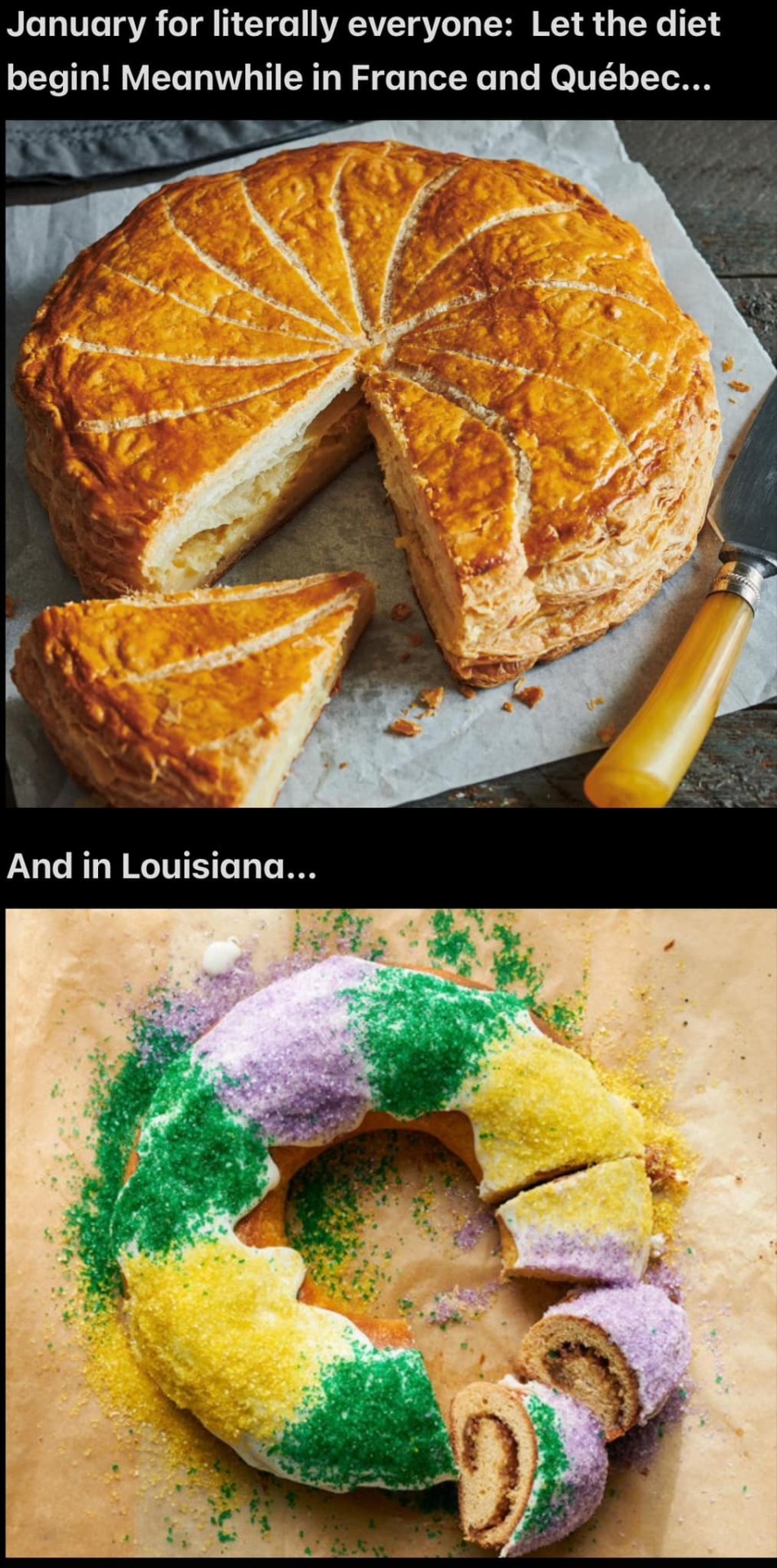
and they asked me to tell them more about Louisiana king cakes, our spin on the traditional French galettes des rois which are still prepared in Québec apparently just as they are in France.
But let's see if I can condense our biggest differences to some bullet points.
Language: Québec is well known for being a majority French-speaking province, whereas Louisiana is...not. Practically all of the Louisianais are fluent English speakers, because starting from the 1870s French in Louisiana was stigmatized and systemically excluded from education, business, and politics. In recent decades there have been attempts at reviving the language, but they've been slow to take root without a foundation in the home to build upon. Both the Louisianais and Québécois practice code switching (the linguistic term for switching between languages in casual conversation), albeit in opposite ways. The Québécois speak mostly French but will include occasional English words and phrases in their speech, whereas as mentioned the Louisianais primarily communicate in English but use a variety of French terms and names as well as direct English translations of French not used in standard English (ex. "making groceries," a literal translation of faire les courses). This stark contrast is because of...
Population and politics: I won't pretend to understand the Québécois political system in any real depth. I do get however that a large part of the reason that they've been able to maintain a limited degree of autonomy as well as preserve their language is that ethnic French people vastly outnumber Anglos in Québec, and Québec constitutes a much larger percentage of Canada's population and economy than Louisiana does the US's, even back in the 19th century when New Orleans was a much larger city relative to the rest of the US than it is today. Beginning shortly after the Louisiana Purchase, Anglo-Americans began moving into northern and central Louisiana, establishing settlements and slowly pushing southward toward and even into New Orleans. This combined with various political maneuvers that progressively weakened Creole control in the area - splitting what are now coastal Mississippi and Alabama, which had initially been settled by the French, off from Louisiana, moving the capital from New Orleans to a then-barely-inhabited upriver border fort: Baton Rouge, which is mostly Anglo-populated despite the name - resulted in the Louisianais having far less control over our own state than what the Québécois have. Compound that with the aforementioned stigmatization of the French language, and many of the Louisianais have been left feeling disenfranchised and unwilling to participate in national politics. Louisiana is a "red state," in US political parlance, because its biggest voting demographic consists of the very same sort of people that make up the surrounding Bible Belt. Speaking of...
Religion: Québec had its Quiet Revolution in the 1960s, largely removing the presence of the Catholic Church and moving closer to France's model of laïcité/secularism. By contrast, Catholicism is still a highly visible element of life and culture in southern Louisiana, and Catholic education continues to be the standard in New Orleans. This is down to several factors, ranging from the poor quality of public services (not helped, surely, by the voters of northern Louisiana who like US conservatives in general recoil in horror from anything that might be dubbed socialism) to a matter of cultural preservation. The Bible Belt is an aggressively Protestant region, dominated by denominations that have historically held Catholics in poor regard. The US at large also has a long history of anti-Catholic discrimination, particularly in large cities like Boston and Chicago where Catholic immigrants formed a large percentage of the working classes. Southern Louisiana, however, has been majority Catholic since the colony's founding over three centuries ago, and presided over by specifically Latin Catholics in spirit if not in actual practice for all that time. The Louisianais have used that to make allies of other Catholic populations who've moved here, mostly the Spanish and Italians but also more recent immigrants like the Vietnamese. While I wouldn't describe most of us as religious in the sense that the US conceives of that term (I'm certainly not), Catholicism is still a crucial part of our heritage and the preservation of this region as a cultural enclave. I've had trolls calling me a conservative religious nut job because I call myself a Catholic, and yet ironically here we associate the Church with the city's decadent and libertine atmosphere. The focus on visual aesthetics, the relaxed attitude toward alcohol and sex and even sin itself...it's all in sharp contrast to the austerity of Bible Belt Protestants who descend upon New Orleans at regular intervals to protest Mardi Gras and Decadence and call us the new Sodom and Gomorrah, etc. And finally...
Climate: I said it before and it's a comparatively much more straightforward issue, but it really does make a difference. When we're in the height of our social season courtesy of mild subtropical winters, Québec is buried under snow. The reverse is true in summer, which in Louisiana is long and lethally hot and humid and plagued by disease-bearing insects and the ever-present threat of hurricanes. This has also affected our cuisine. Louisiana has a rich and internationally-recognized culinary tradition that builds upon a French foundation with a wealth of local innovations based on crops that thrive in this climate as well as the bounty of the Gulf of Mexico. Québec has...poutine. Obviously I'm joking a bit there, but it's telling that there are multiple Louisiana-themed eateries in Montréal - but the reverse is not true. I've always heard that hot weather climates produce richer and more diverse cuisines than cold weather climates, and I suppose that in this case at least it's true.
8 notes
·
View notes
Text
I just learned Karl Tremblay lost his battle to cancer last Wednesday. if you dont know him, he was the singer for a left-wing anti-capitalist folk rock band in Québec called "Les Cowboys Fringants".
My generation grew up to their songs on the radio. Growing up, I was quite fond of them because they told stories from the perspective of the quebecker lower class, things that I could actually relate to, stories about real people I could know. A trucker in the great north like my father, that one alcoholic uncle we all have. They sung about the explotative nature of capitalism, but also about the mortal nature of existence, and how quickly life passes us by.
When I was younger, I'd look at maps and wonder why my town was never on them. My whole life people have told me there's nothing this far north that's worth driving 9 hours for. And then Les Cowboys Fringants released a song in which they sang about the unmatched beauty of the northern lights in my hometown. Cannot put into words the feeling of hearing my town's name mentioned for the first time, for the whole world to hear, and have it be about the beauty of it.
Their songs meant a lot to me, so I just wanted to make this little post is all. Rest in power, Karl Tremblay.


8 notes
·
View notes
Photo



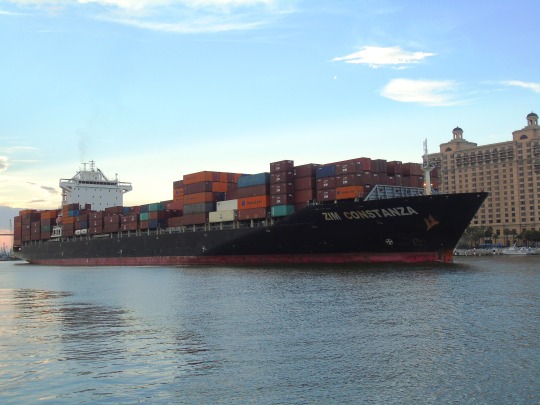





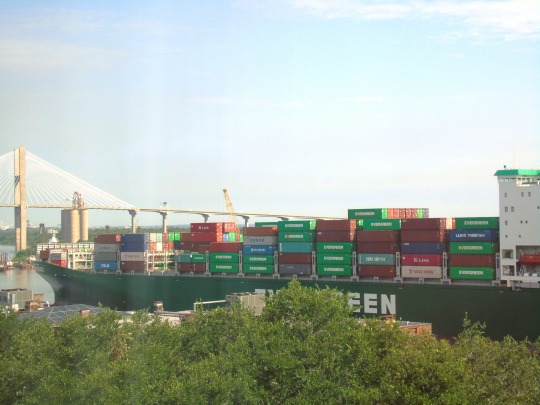
The SS Ideal X, the world's first successful container ship, left Port Newark, New Jersey for Houston, Texas on April 26, 1956.
#Halte de Sainte-Geneviève-de-Berthier#Trois-Rivières#Prescott#Canada#USA#St. Lawrence River#first container ship#26 April 1956#US history#original photography#anniversary#Savannah River#Savannah#Georgia#Ontario#Québec#Baltic Sea#Northern Europe#technology#cityscape#seascape#waves#travel#vacation#tourist attraction
6 notes
·
View notes
Text
JAMES BALDWIN

I came across a conversation between the African-American writer James Baldwin and the host of a Radio-Canada show, Fernand Seguin. The interview took place in September 1967, about a month before I was born. I mention it because the subject of the interview has not aged a bit.
I want to say that Fernand Seguin is a good TV Host, and the following is not a criticism of his work.
I was pleasantly surprised by James Baldwin's French. He manages to get his message across with passion and his host has no difficulty understanding. From time to time, he says a word in English.
There are strong moments in this conversation, and I would like to focus on them to illustrate the relevance of the debate on the racial question in the United States and in the West in general.
The journalist's first words reveal the state of mind of Canada and Quebec in 1967. They do not pay much attention to what is happening to their neighbor. Fernand Seguin tries to wake them up, to make his compatriots aware of the importance of the struggles for civil rights.
“We can no longer speak of riots angered by the summer heat,” declared Fernand Seguin. The year is 1967. There had already been the 1963 riots in Alabama over segregation in schools. Malcom X was no longer, assassinated in 1965. Riots exploded in Cleveland in 1966 and in Detroit in 1967. Fernand Seguin tries to inform Québec that it is about time to take these events seriously.
The journalist's first question does not achieve its goal. He wants the writer to tell him about the events from his childhood that made him understand that he was experiencing racism. But James Baldwin replied that a child cannot know what racism means. When Fernand Seguin persists, the writer talks about the attitude of his father who clumsily tried to protect him from racism. For him, there was no hatred when he was growing up. There were unwritten prohibitions. Black people knew the limits not to be crossed. For example, he said, interracial marriages were prohibited.
The journalist asks the writer the reason for the racial violence in his country. As in his books, James Baldwin is direct and reminds us that his country is in total denial of its slavery past.
I found it ironic that James Baldwin denounced the false Christianity of white Americans. The show was called “Salt of the Week”. The biblical symbolism of salt is indicative of a Quebec era close to Catholicism. Certainly, Prime Minister Jean Lesage had already carried out important reforms in Quebec until 1966, but this title remains an indicator of a Christian influence which refused to disappear completely.
Fernand Seguin will speak of “the hypocrisy of white Christians” and the writer will correct him. It wasn't about hypocrisy. “Do you have a worse word than that?” asks the journalist. James Baldwin points out that white people believe their lies about black people. So, they are not hypocrites, it is worse. We are beyond hypocrisy. James Baldwin makes it clear that these white people suffer from a form of denial, from intentional blindness.
This blindness is still present today. When Donald Trump maintains that Democratic candidate Kamala Harris is not really Black and this is accepted among his supporters, it is a denial. Mrs. Harris has a black father. This is an accepted lie that Trump imposes, and many Americans share it. However, Ms. Harris is like Barack Obama who is considered Black.
Another intense moment is when the author explains to the journalist that the Civil War (1861-1865) had nothing to do with the liberation of slaves. It was a war between two capitalist systems. “The black man was a pawn,” says the author. This is a truth that is difficult to assert even today.
Donald Trump was born in New York. He is therefore from the North and hearing him question the black origins of Kamala Harris shows that Northerners are no less inclined to denigrate minorities than Southerners.
Prophetic as usual, James Baldwin corrects the words of the journalist who speaks of hope about the liberation of South Africa. “It is not a matter of hope, that’s absolutely certain.” Today we can see that the writer was right.
In this show, we witness the meeting of a black-American preacher and a descendant of French settlers who was raised Catholic.
“My own father sold me like cattle, killed me like cattle”. The journalist responds “morally”. James Baldwin replies “No, currently��. The African-American gives as an example a black nanny whose son was killed by the white child, she had taken care of, once he became adult.
Fernand Seguin believed that the writer was talking about moral cruelty. But it’s a preacher’s speaking style. The writer uses the present indicative even for a past act and he can speak of another's father as if he were his own. It’s a way of showing that he feels the nanny’s pain as if it were his own. The Quebec journalist did not understand this rhetoric because he was not raised in this type of environment or because he had not read many books by James Baldwin.
We arrive at the crux of the interview. The journalist talks about Malcolm X and says he was an extremist and preached violence. Baldwin corrects once again. “He was not an extremist.” So, Fernand Seguin feels obliged to declare “I speak like a white man” to justify the way he characterized Malcolm X.
The host of “Salt of the Week” seems to make it clear that he plays the role of conservative, that he is not necessarily. We have the impression that there are two discourses. The real one and the other which is to “speak like a white man”. I find this line fascinating. I am not criticizing Fernand Seguin. I note that in 1967, you still had to play a role on television.
James Baldwin responds that Malcolm X was a revolutionary. Then he drives the point home by bringing out the “N” word to say how America calls revolutionaries like Malcolm X. He’s going to say it twice.
From that moment on, Fernand Seguin lost Baldwin's trust. The writer understood that the journalist plays the role of devil’s advocate. The host calls Stokley Carmichael (Kwame Ture) a black leader. The author will tell him that he is not a leader.
“It’s a phenomenon.”
At the end, Baldwin reminds the reporter that black despair is not organized. Indeed, Fernand Seguin speaks of organized revolution. The author concludes that “If it were organized, it would not be the ghetto that would be in flames, but the city.”
The show ends with Baldwin's voice and the credits rolling as a trumpet plays jazz.
Didier Leclair, writer
Pic: All Rights Reserved
3 notes
·
View notes